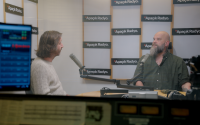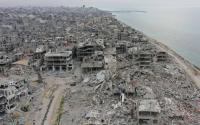Counterpunch, 18 September, 2001
[This interview with Rep. Barbara Lee was conducted by our friend Davey D, editor of the excellent newsletter on Hip Hop and politics, FNV. Please visit Davey's site and please sign up for his newsletter.http://www.daveyd.com -AC/JSC]
On Monday Sept 17th we had an opportunity to catch up with Congresswoman Barbara Lee and talk to her about her decision to cast the only vote opposing President Bush's War resolution. Not even her fellow colleagues from the Congressional Black Caucus voted with her on this one. That includes such notable people like Maxine Waters, Charles Rengel, Jesse Jackson Jr., Cynthia McKinney to name a few. What is this all about?
Is Congresswoman Lee out of step with reality and the rest of the country? Or is she ahead of her time? Some people are saying she is unpatriotic for not supporting Bush on this one. They are angry with her to the point that she now needs police protection. Others are saying she did the right thing by not only following her conscience, but also bringing to the floor and public discussions, an alternative viewpoint that has been all but locked out of this past week's conversations. Many are claiming something is wrong with you if you are not advocating war. Here's what Congresswoman had to say...Let us know what you think.
DAVEY D: They took this vote in Congress about what should be the response to the tragedy this week...and elected to take military action. In a vote 420 to 1 you were the lone dissenting voice that said no, we should not go to war.
BARBARA LEE: First, our nation is in grieving, we're all mourning, we're angry; there are a range of emotions taking place. Myself personally, I am also grieving and I believe fully and firmly that the Congress of the United States is the only legislative body that can say, "Let's pause for a moment...and let's look at using some restraint before we rush to action." Because military action can lead to an escalation and spiral out of control. So, why I voted no, was one, the president already has the authority to execute a military action. He doesn't need Congress; under the War Powers Act he has that authority. But Congress is the people's house, and the Congress is responsible for providing checks and balances, and you cannot ju st allow the administration to run ahead with a strategy without reporting back and without having some oversight.
Now we must bring the perpetrators to justice. International terrorism is upon us -- this is a new world and we cannot make any mistakes in dealing with it. We do not want to see our reaction lead to another reaction which could allow this to spiral out of control. So while we grieve and while we provide assistance -- and I did vote to provide assistance for the families and communities that have been devastated and also providing funding for anti-terrorist activities for securing our own country -- we've got to conduct a full investigation and be really deliberate about how we move forward militarily. We cannot make any mistake about this, this is an unconventional war and we have to fight it in an unconventional way.
DAVEY D: We're talking about the nature of terrorism and whether it could be a tit-for-tat type of scenario if we go out and retaliate and hit the wrong targets or capture the wrong people, the next thing you know we could be involved in a situation where a can of worms has been opened that we just can't close it up.
BARBARA LEE: We don't know the real nature of terrorism in the true sense of the word. We have not invested in combating terrorism the way we should have, which involves many issues. It involves our foreign policy, it involves multinational cooperation, it involves diplomatic efforts. It involves pulling all of these very multifaceted areas together to come up with a real way to deal with terrorism. I don't believe we have faced the fact that terrorism is the new war that this country is going to have to fight. We're looking at putting up billions of dollars for national missile defense. Well, anti-ballistic missiles -- that would not have saved the lives or prevented the horrible morning that we saw last Tuesday, it just wouldn't have done it. So, we're looking at putting military money into the wrong areas. We need to look at what this means in terms of securing our country, securing our world, and how to use our tax dollars toward that purpose. I am convinced that military action alone will not prevent further terrorist attacks.
DAVEY D: One of things I'm concerned about is the number of people of color who will be on these front lines. A third of the army is made up of people of color, because of the economic conditions we're in. If we have to go out there and fight a war, how is this going to impact our communities disproportionately -- and are we going to have some dire effects that will be with us for generations?
BARBARA LEE: Certainly, that's always the case -- our communities are always disproportionately represented in the military and we'll be called to serve and fight. Whenever that happens, whomever it is, we have to be very careful. We don't want our young men and women put in harm's way. I am a very patriotic person, and I support the United States and our government. And I believe that my support for our country and for our people dictates that I be prudent, that I not rush to judgment on any decisions, and that we step back for a minute and realize any impact that this could have on young men and women of color, and all young Americans as we move forward. Fighting a terrorist war...I'm not sure our young people are prepared for that, and we've got to stamp out terrorism in the world but it's very complicated.
DAVEY D: I've got the sense that people think that this will be over in a hurry, almost like you're playing a game, and I'm trying to tell people, that this is real stuff. You've got people that have committed themselves to dying, and that's kind of scary.
BARBARA LEE: We're all in trauma right now, in a state of disbelief and mourning. A member of my staff had a family member killed in one of the planes. This catastrophe has touched the lives of so many people. Going back to why I said "No, let's use restraint," -- it's for that reason. My professional training is as a social worker, and I understand the human psy che, and the community psyche, and our country's psyche. Right not, were dealing with recovery, and we're dealing with mourning, and there's no way until we settle in, should we deal with decisions that could escalate violence and spiral out of control. We just all must be reasoned and reasonable about this. When we bring these terrorists to justice, we have to be pointed and know what we're doing. The world is a dangerous place.
DAVEY D: With all the money that we pay in tax dollars directed toward intelligence gathering, the CIA, the FBI, the racial profiling at airports and the like, how could we have someone come in to this country, learn to fly from our own schools, and fly an airplane for 20, 30 minutes and not be detected? Was this a breakdown in the intelligence community?
BARBARA LEE: Obviously, that money has not been spent properly and I think that one of the reasons I did vote for the $40 billion is that there's money in there to really look at how we increase the public safety of our people in this country, within the confines of civil liberties. We have to find that balance. Protecting the public, protecting the country, and not allowing our civil liberties to be eroded. That's where we need to put the funding and resources, and that's why I did support that money. But something went terribly wrong, and we'll see how these investigations go. But we have to insist on a full and thorough investigation.
DAVEY D: Do you think with all the concern right now, we will be finding our civil liberties actually taken off the paper altogether in the name of national security? Will people be pulled over, profiled, searched more? If I'm a part of an organization that says "Peace not war," will they label me a potential terrorist?
BARBARA LEE: Certainly we have to fight against that trend. There are those who would like to see that happen. They will overreact to a tragedy and use this opportunity to do just what you said. That's part of the danger in rushing to judgment. As a branch of the government that's responsible to the people, it's up to Congress to execute our Constitutional responsibilities to ensure that there's checks on policies that could be put in place under the name of national security. This is very serious.
DAVEY D: You've come from an era of the Black Panthers, from the Vietnam era, when there were a lot of groups that found themselves subjected to the Cointel policies of the FBI. They were harassed by the various government agencies, from the local police to the CIA, their patriotism was questioned. If we don't keep that in mind, do you think it might lead to us just falling in line and maybe not questioning government when we have a right to do so?
BARBARA LEE: We better understand the history, and I'm very on top of my own history with these agencies and I know what can happen. So we must be vigilant right now, because under the cloak of national security, many of our civil liberties could be just wiped off the floor. There are those of us who are going to fight to make sure that's not going to happen, but we're also going to fight to make sure justice is served by making sure that the people and organizations who did this are brought to justice. We also have to begin to look at our foreign policy, our diplomatic efforts, and some of the reasons why we don't engage in dialogue with certain countries and individuals and organizations. This is a very complex issue in the US, and we should be right now leading the world in showing our children how in the face of adversity we respond and minimize the loss of life. We don't want to see any more people lose their lives. We cannot tolerate another terrorist attack, and we certainly cannot tolerate any loss of life any more in our country, and anywhere in the world.
DAVEY D: Many are painting a picture that, "if you're not with the US, you're against us. " They would take a look at your dissenting vote and say, "Congresswoman Barbara Lee is not patriotic, she's not supporting the president, she's making it difficult for us to do what we need to do." How do you respond to that type of criticism?
BARBARA LEE: People have said that. And in my response, I tell them that I'm very patriotic. As a citizen, I have the right to represent a point of view. That's central to our democracy -- the right to dissent, the right to provide a different point of view that's out in the open, in the full view of the American people. I did not make this decision behind closed doors; I've explained my decision. I think the beauty of democracy, and one of it's fundamental principles, is the right to free speech and the right to disagree. I support the administration in their actions; that's not the point. Their role is this, they're moving forward. What we have to understand, is that the Congress is a body that represents the people in our country. It's up to us to step back and say, "Okay, now we have an additional responsibility." We must make sure that the president reports to us, so that we can report back to our constituents what's going on. You donut want to not know, do you?Congress has a very critical role in this. So if I am going to be patriotic, and I am, and if I am going to be a good American, which I know I am, I am going to make sure that our democracy works and I'm going to hold it accountable, and make sure that it works not only for my constituents, but for the whole country. You don't want to rush to judgment while we're depressed and angry and frustrated. That's like herding cattle in one direction. You want people who are thinking clearly, who are working with the president, and giving them different ideas and insights. I'm an African-American woman, I'm on the International Relations committee. I have a point of view...as an American...that may be useful when we talk about international terrorism. There are many people who have different points of view...that's America. So to those people who say those things, they better check their own credentials. They may need to become more participatory in our democracy.
DAVEY D: That's a key word -- participatory. I come across a lot of people who are waving the flag, but aren't registered to vote. All this information about foreign policy and our government's role has been out there, but a lot of people have ignored it until now. All of a sudden, they're out for blood, and don't even understand where Afghanistan is and what it would take to defeat it. This is a country that beat back Russia, a couple of times. It's not going to be an easy haul, and I'm afraid people aren't really thinking long term.
BARBARA LEE: Being patriotic at this moment in our history means participating in decisions about the future of our world. It means participating in decisions that will hopefully bring us to peace, and ensure that these terrorists are brought to justice and that no man, woman, or child, ever gets killed in such brutal assaults ever again That's what participatory democracy is about at this moment. People should feel understand and feel empowered that it's through their members of Congress that represent them, that they can make their voice be heard. Not just react, but engage.
DAVEY D: People would question, would you acting on behalf of Barbara Lee or were you acting on behalf of the Berkeley-Oakland district you represent when you decided to be that lone dissenting vote against Bush's resolution for war?
BARBARA LEE: First of all, this was not a poll-driven vote. This was the most painful vote I have taken in Congress, really in all 12 years that I've been in elected office. It was a grueling experience for me. I have been in many briefings, classified and unclassified. I have been in so many meetings. I was in the Capitol when the plane went into the Pentagon, and we had to evacuate. It's been a nightmare. I went through the intellectual process, through the fact-gathering, through the policy analysis, looking through the foreign policy and intelligence and military implications of our move. It weighed heavily on me. I was not going to the National Cathedral for the prayer service..because I wanted to continue in my discussions, and reflect on the resolution that was coming up. But at the last minute, I decided to go, that I had to pray over this. I realized I had to settle down and say some prayers, to try to get some strength to help me through the rest of the week.
It was a very powerful, very beautiful prayer service, very painful. I listened to the prayers, and prayed, and listened to the comments and the sermons. One of the clergy, very eloquently said, in his prayer, "As we act, let us not become the evil that we deplore, " And at that moment, I knew what the right vote was, and what I had to do. So it was a combination of factors that brought me to that place. There are very few times when there are votes of conscience that your moral compass must guide you, very few times that there's some bottom lines. And this was one of those times. I talked to my colleagues, and believe me, there are many members of Congress who feel as I feel, who are raising questions about not having the President report back on military action. People are concerned. I think my vote represented my week of deliberations, my discussions, my thoughts, my analysis, and my conscience, and I voted 'no.' I believe it was the right vote. I still say, and I said on the floor that night, "We must step back." We must allow time for the grieving, and the mourning. Congress has got to be the body that says, "Let's use some restraint, lets make sure that our actions lead to what we want to accomplish, and that's to make sure their are no more attacks on our people and on our country" We've got to make the most deliberate strategies that we can that are going to be effective.
DAVEY D: There's been a number of attacks throughout our country on our Arab brothers and sisters...even on those who look like they might be Arab. Sadly, some of this abuse has come at the hands of black and brown folks, who have gotten caught up in the wave of patriotism that has swept the country. What are your thoughts on this?
BARBARA LEE: This is very a serious problem. We passed a resolution on that same night that condemned attacks on Arab-Americans and Muslims and all those who could be under attack as a result of this. What we see now is an environment of fear. The worst is coming out in people. We've never had a war on our land before -- other countries have, the US hasn't. Were vulnerable. When people react in fear, what do they do? They turn on each other. The person who looks the wrong way receives the brunt of your anger and fear. So I'm urging and encouraging young people to please understand that when these planes crashed into the towers, they killed people of all colors, ages, races. creeds. It was an equal opportunity destroyer.
DAVEY D: It just seems a shame that people who have been persecuted, especially blacks and Latinos, who have been the brunt of abuse by the military, are turning around and attacking people in our own communities. Once upon time Latinos in LA were attacked by US Sailors in what is now known as the Zoot suit riots. African Americans were at the short end of the stick in numerous situations and scenarios
BARBARA LEE: We've got to pause and understand the moment that we're in. Moving forward, whether it's on a political level, or in our communities, against each other, there's some serious implications of this. If we donut understand that were grieving, we're baffled, we're afraid, this behavior is going to escalate. I'm trying to help young people understand who their enemy is and who it is not. In this moment of all moments, we should be embracing each other. My constituents are as conflicted and upset in California as people are all over the East Coast and the country.
DAVEY D: Do you think when you get back to Bay Area, you'll have some kind of a town hall so that those people that voted you into office can come on down and build with you?
BARBARA LEE: We' re definitely going to be holding events in our community to try and help sort though this grieving process. In terms of future direction, we want to bring some clarity and understanding as to how the Congress should function when we're in a vulnerable state, when we've been attacked and what our role is in terms of checks and balances. I want to do some education and forums and basic discussions with young people about their fears. I know children are scared about what they're seeing on TV But the way our country responds to it will ensure as they grow up that they are able to deal with their problems in a way that is appropriate. It's important that they see that rage and war gets out of control and leads to more violence. We have to be very measured in our response as we go after the perpetrators of this horror, and make sure that our children know that in the face of adversity, America can rise up and be the great democracy that it is, and deal with all these problems immediately.
DAVEY D: Have you heard from any high ranking officials about your vote. Also, Bush has two daughters who are college age...do you think that they would be on the front line? How do you think it will perceived if 19 and 20 year olds are being asked to serve this country and his daughters are still making headlines getting drunk at rat parties??
BARBARA LEE: That poses the kind of questions and dilemmas before us. There are many questions that have to be asked..the kind of terrain ahead of us in a country we don t know, how much collateral loss will we be inflicting in terms of innocent women and children? Loss of life is loss of life. The Congress needs to ask these questions, force the administration to answer these questions. That does not mean that we, and I, are not unified. I'm sure I will hear from the administration, I'm on the foreign affairs committee. I see Secretary Powell fairly frequently. I haven't talked to him. Hess been fairly measured in his response, I think Hess trying to bring some balance to the policy. But in terms of supporting the President, that Congress has to make sure that he is successful, that any reaction to this horrible attack does not come back in terms of any spiraling out of control. If you have nobody to check that, it could be very scary.
DAVEY D: Congresswoman Lee thank you so much for taking time out of your day to break it down for us. To reach Barbara Lee call her at 510-763-0370






